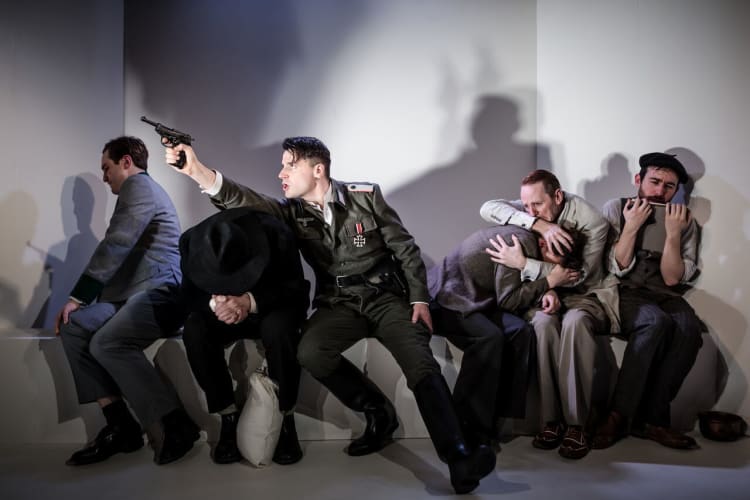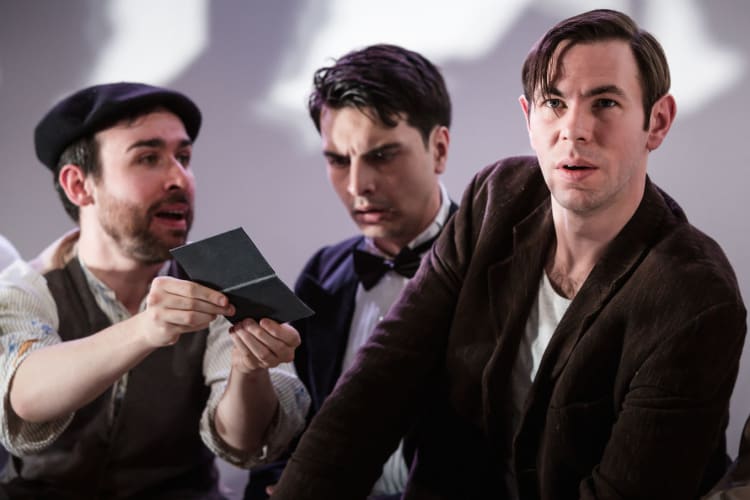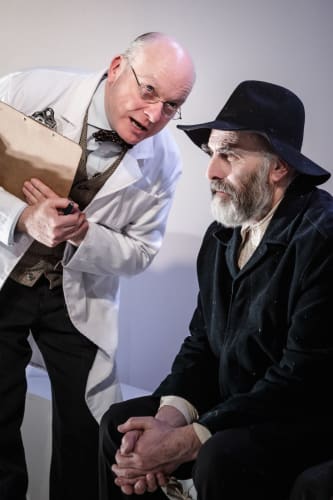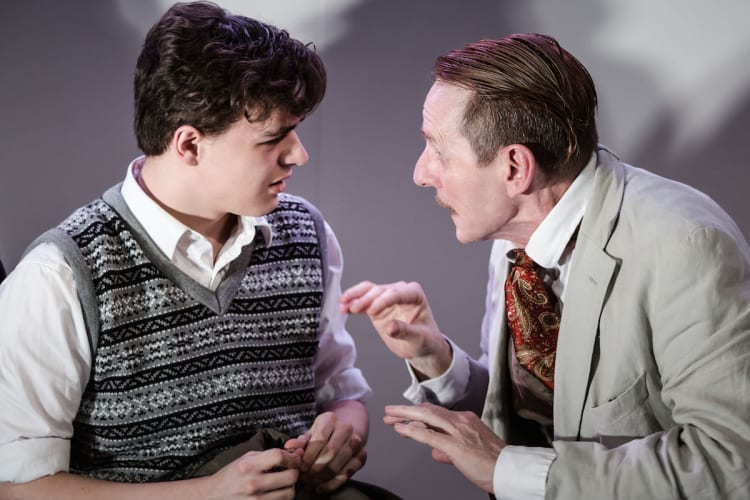It is 1942 in Vichy France; in this “unoccupied” territory, supposedly still run by the French authorities, people may feel safe from what is happening in Paris and the German controlled part of the country but there are rumours. The SS, with the co-operation of the French constabulary, are extending the reach of Nazi ethnic policies.
Miller here presents a line-up of men pulled off the street with no explanation except to check their papers. But why do they have to come to this place to do that and why is it taking so long for someone to see them?
There’s M. Marchand, a businessman concerned that he will miss an appointment (Christopher Laishley who also doubles as a policeman), and Lebeau, a neurotic young artist who can’t stop talking and gets on the nerves of the others (played by Lawrence Boothman with a high-camp Scots accent); at first he adds an element of humour but soon the situation gets too serious to be funny.
There is a worried gypsy (Andre Crespo) who is keeps very silent, a boy (Daniel Downing) totally confused, who had been stopped on the way to pawn his mother’s wedding ring to raise money for food, and a waiter (Michael Skellern).
Bayard (Brendan O’Rourke) is an electrician and a socialist and Leduc (Henry Wyrley-Birch) also seems leftist: he says he had come in from the country, isn’t up to date with what’s happening, but it turns out he’s a former psychiatrist who has worked in Vienna, while Monceau (P K Taylor) is an actor who feels its important to display confidence to behave like a victim. Later, an Austrian nobleman, Von Berg (Edward Killingback), and a grey-bearded man who looks stereotypically Jewish (Jeremy Gagan) are brought in.
There seems little in common among this group. Maybe it is a random document check, except that those arresting them measured their noses: there is something they may all share.
The self-important businessman is first taken in for inspection and he comes out with an approved pass, but as the others wait they begin to talk about rumours, overheard information about what is going on, and reveal some of their own recent experience.
It is extremely unlikely that people would talk so openly or so loudly in this situation but, though the feelings and the performances of all these characters are very real, this is not a naturalistic play but a setting for the presentation of attitudes and arguments exploring reaction to the situation.
Director Phil Willmott presents it in a blank white setting on a shallow stage where the men are lined up on a bench facing out to the audience. Although their situation may move us, there is a Brechtian insistence that we observe the process that undermines opposition and brings acquiescence. On one side there is the guarded exit to freedom, on the other a place that you enter on orders through a door that clangs closed like a prison cell or a cattle truck transport or an oven door in an extermination camp.
The socialist and the psychiatrist are more cognisant of what is happening; they argue for resistance and an attempt at escape. The actor cannot believe that people as cultured as the Germans could do terrible things (yet he has already fled Paris—is he trying to delude himself?), but the Austrian has already seen them take away the cellist of his private orchestra, listening to him finish playing before taking him off. Is this man’s obvious affection for his musician a reference to the homosexuals caught up in the Holocaust along with the Jews and the Gypsies? For now he is given his freedom.
The Vichy police are shown as complicit in the inspections which are carried out by a Professor of Racial Anthropology (Timothy Harker), theoretically supervised by a regular German Army Major (James Boyd) who has qualms about what is happening but then thinks of his own skin. It is the aristocrat who represents the “good” German, with a Sidney Carton like sacrifice.
This is a 90-minute play through which both argument and tense situation concentrate the attention. It could easily become one key but Willmott's direction avoids that. Lebeau is removed just when he begins to irritate the audience as much as those with him and a dramatic intervention from the Major varies the pace just when needed.
The Vichy situation was a particular one historically but this could be anywhere that authority persecutes people for being who they are or what they believe in. While the direct reference is to the Holocaust, it also echoes questions of compliance or resistance raised by the House Un-American Activities Committee (before which Miller had been called to give evidence).



